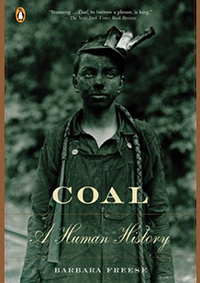 Last week on the flight to and from Denver, I consumed (via audio book, freely downloaded from my public library system) the 2004 microhistory Coal: A Human History, by Barbara Freese. It’s light on the geology, and heavy on the historical implications of coal. As with many of these sorts of books, it’s basically a compilation of related nonfictional explications of topics of diverse scope, all of which have a connection to a single subject, in this case, coal. Labor unions? Trains? Manifest Destiny? Canals? Check, check, check, check.
Last week on the flight to and from Denver, I consumed (via audio book, freely downloaded from my public library system) the 2004 microhistory Coal: A Human History, by Barbara Freese. It’s light on the geology, and heavy on the historical implications of coal. As with many of these sorts of books, it’s basically a compilation of related nonfictional explications of topics of diverse scope, all of which have a connection to a single subject, in this case, coal. Labor unions? Trains? Manifest Destiny? Canals? Check, check, check, check.
The cultural connotations were interesting to me. Some people read their god’s beneficence in coal’s energy storage and ability to warm. Others read the punishment of their god in the hellish conditions of the coal mine – the earthbound damnation of people – or in the intense smog that resulted from unregulated coal burning in dense urban settings. (One particularly fascinating passage detailed “The Black Fog” of London, wherein a temperature inversion trapped an ever-thickening wad of coal smoke in The Big Smoke over the course of a week.) In the introduction to the book, Freese makes a telling comparison between oil and coal in terms of the way we perceive them. “Striking oil” is an expression of luck, while if you’re a bad (Christian) kid, you’ll get a disappointing lump of coal in your stocking. It’s glamor vs. poverty.
Before reading this book, I had not realized that it took a different kind of stove to effectively burn anthracite coal, as opposed to bituminous coal. U.S. cities would specialize in one or the other. New York was an anthracite town, while Pittsburgh was a bituminous borough. There were tribal and practical tensions that resulted, of course: people will find any doggone excuse to treat each other inhumanely.
Freese is a lawyer, and so she brings a lawyerly perspective to the book. She recounts an early case in Newcastle-upon-Tyne, for example about who exactly owned the coal in the ground. These are the legal precedents that wrought the system we have today, and I found it interesting –to a point– to examine these historical case studies.
She also brings some medical expertise to bear. I was fascinated to learn about the numerous connections between skin diseases and coal. “Carbuncle,” for instance, is a term meaning “small ember,” so named for the resemblance of those skin irritations to glowing embers. Along similar lines, the word “anthrax” apparently comes from the Greek for coal, and the buboes of the bubonic plague (black swellings of the lymph nodes) were repeatedly compared by observers as looking like coals. Again – these are all negative connotations.
One thing I appreciated about the book is that Freese grants no editorial concessions to science deniers (you’ll recall this was a particular beef of mine with Simon Winchester’s Atlantic), either with regard to climate change or evolution. She’s very even-handed but firmly matter of fact. She has no truck with such irrational fantasies.
Climate change is where her interest in the topic of coal began – as an attorney for the state of Minnesota as they grappled with the legal math of independently assigning a greenhouse “cost” to various fossil fuels. Her journey into coal traverses hundreds of millions of years and the modern globe, but focuses mainly on 1700s and 1800s England, 1800s and 1900s America, and present-day and future China. The latter is explored in a travelogue sort of style in the book’s final chapter.
If your job or hobby is coal-related, you’ll have to read this book. If coal is merely a side interest, then it’s not as essential. It held my attention, but really “only just.” A lukewarm review, overall.

You could probably tell me exactly where these mines are.
I know you could correct what are probably egregious errors.
A photo-essay about coal, and mines, seen from the air.
http://thetompostpile.wordpress.com/2013/07/07/minus-the-mountaintops/
” it’s basically a complication of related nonfictional explications ”
It the book a complication or a compilation? I would rather not read a complication of explanations.
Oops. Thanks for catching that. Compilation. Fixed it.
I just thought Callan was using correct plural terms. As in: A murder of crows. A regression of statisticians. A complication of explanations.